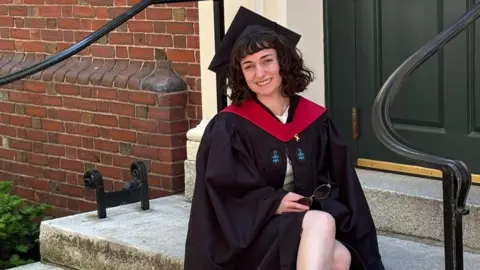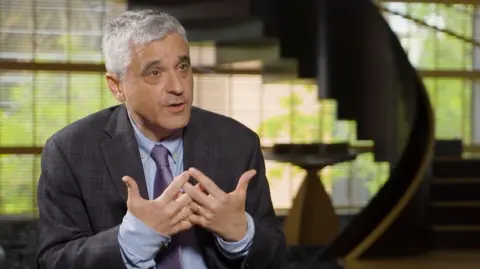Harvard's Jewish foreign students are afraid of Trump Row

Corresponding to North America
If President Donald Trump says he was punishing at Harvard University to protect Jewish students, not everyone is convinced.
More than 2,000 Harvard students identify as Jews, and for some of those from abroad, Trump's rhetoric has aroused fear and uncertainty.
“I thought that when I left Israel, I left a conflict zone,” the doctorate, 41, told me.
They are foreign students like her who fear to become collateral damage in Trump's repression against some of the most elite universities in America.
After trying to exceed Harvard of his ability to register international students, the Trump administration underwent a legal blow on Thursday when a judge said that she would block the move while the case takes place in court.
But the decision is not very likely to de-escalation the conflict between Trump and Harvard, an institution which he accuses of being too much left and not to fight anti-Semitism when pro-Palestinian demonstrations took place on the campuses.
“It was difficult. We had speakers invited here by saying that my inheritance and my sacred texts should be decolonized, and question my existence,” says Genia, who studies psychology.
She is halfway through her studies which focus on acquiring language among blind babies. It fears to be returned to Israel if the foreign ban prevails.
“I think it is very important to learn to be uncomfortable and offended. But I think it should be applied on both sides … It was not balanced.”
“I have had two years to face massive quantities of campus hostility and now we get this chaos … It doesn't make things better.”

In a small intervention by its attempt to end the international program of university students, the government gave Harvard 30 days to prove that it meets the requirements of the registration of foreign students.
If the measure is finally authorized, it could bring a devastating blow to university, where more than a quarter of students are from overseas. There is no exception for Israelis or other international Jewish students.
An order designed to protect Jewish students like Genia seems to have put them abroad at risk. This led to accusations that President Trump politicized anti -Semitism.
Genia says: “I think it is very important that we recognize that there is a distinction between what we want and what the American government probably wants.”
The President of the University insists that Harvard has taken major measures to fight against all forms of hatred, including anti -Semitism. Alan Garber says that the Cups that the Trump administration impose on the institution “will hurt” the country, not only Harvard, because academics conduct research deemed “high priority” by the government.
Nitsan Machlis, 27, is about to graduate. Her family is there to see her walk on stage in her cap and her dress. It is optimistic but this feeling has been missing for some time.
“For the first time for a long time, I have been very proud to be a student at Harvard. Harvard suffered immense pressure from the Trump administration, and the institution has shown that she was making decisions with integrity to defend her academic freedom and not to bow to the takeover,” she said.
“The university still has a lot to prove and do in the fight against anti-Semitism,” she adds, “but I am proud of what President Garber says and does”.

Another Israeli from Harvard – who works as a researcher – is concerned about the approach of the Trump administration. The 38 -year -old man did not want to be identified because she weighs his future.
“I see that Harvard really tries to solve the problems … but you cannot change their culture and problems. These are not specific problems in Harvard, and these are not even problems of the American elite. These are big problems in the world and it does not take a week, or a day, to solve them.”
It draws parallels with its country of origin and adopted country
“The Israelis have experienced a very intense democratic decline and I think we should be the first to recognize what is happening here in the United States.”
Professor of Harvard Steven Levitsky goes further. He has spent decades studying authoritarian governments and believes that President Trump uses anti -Semitism as a coverage to raise the education of the elites under his control.

“We are the biggest fish. We are the most important, the most prestigious and also the best university in the country. So, if you want only one representative of higher education to take a hit, Harvard is the obvious target,” he told me.
“If the Trump administration is capable of intimidating Harvard in the acquiescence, he knows that no other university will be able to resist it.”
By reflecting on the experience of anti -Semitism throughout his life, he says: “I have never seen or experienced anti -Semitism here at Harvard. And therefore the kind of concept that we have a serious problem that requires federal intervention, as a Jew who lives here for 25 years, I can tell you that it is laughable.”
But this current battle threatens to leave Harvard in a different place even if the school succeeds in his fight. Many international students say they are already looking to build their academic future elsewhere, while others who have graduated say they plan to bring their skills to countries outside America.
Additional report by Eva Artesona





